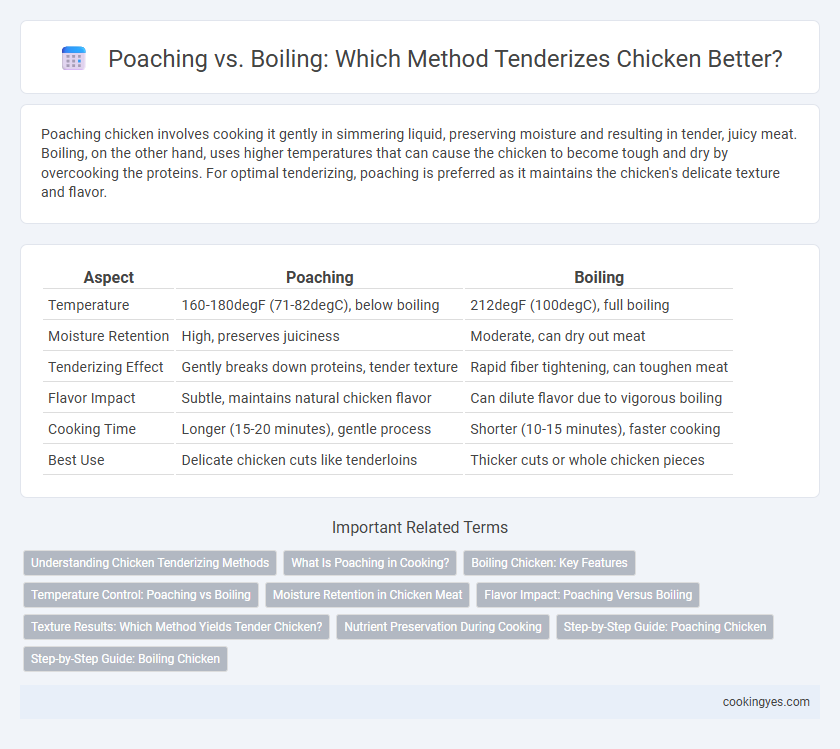Poaching chicken involves cooking it gently in simmering liquid, preserving moisture and resulting in tender, juicy meat. Boiling, on the other hand, uses higher temperatures that can cause the chicken to become tough and dry by overcooking the proteins. For optimal tenderizing, poaching is preferred as it maintains the chicken's delicate texture and flavor.
Table of Comparison
| Aspect | Poaching | Boiling |
|---|---|---|
| Temperature | 160-180degF (71-82degC), below boiling | 212degF (100degC), full boiling |
| Moisture Retention | High, preserves juiciness | Moderate, can dry out meat |
| Tenderizing Effect | Gently breaks down proteins, tender texture | Rapid fiber tightening, can toughen meat |
| Flavor Impact | Subtle, maintains natural chicken flavor | Can dilute flavor due to vigorous boiling |
| Cooking Time | Longer (15-20 minutes), gentle process | Shorter (10-15 minutes), faster cooking |
| Best Use | Delicate chicken cuts like tenderloins | Thicker cuts or whole chicken pieces |
Understanding Chicken Tenderizing Methods
Poaching chicken involves gently cooking it in simmering liquid at low temperatures, preserving moisture and resulting in tender, juicy meat without drying it out. Boiling, by contrast, uses higher temperatures that cause muscle fibers to contract more aggressively, often leading to tougher texture if not carefully timed. Choosing poaching over boiling can enhance chicken tenderness by maintaining a controlled, gentle heat that prevents overcooking and fiber tightening.
What Is Poaching in Cooking?
Poaching in cooking involves gently submerging chicken in a simmering liquid, typically water, broth, or wine, at temperatures between 160degF and 180degF to achieve tender, juicy meat without overcooking. Unlike boiling, which uses higher temperatures and vigorous bubbling, poaching preserves the chicken's delicate texture and moistness by minimizing protein fiber contraction. This method is ideal for preparing lean cuts like chicken breasts, ensuring enhanced tenderness and subtle flavor infusion.
Boiling Chicken: Key Features
Boiling chicken involves cooking the meat in rapidly boiling water, which helps break down muscle fibers for a tender texture. This method often results in a firmer, denser meat compared to poaching, as the higher temperature extracts more proteins and natural juices. Boiling is effective for making chicken ready for shredding or use in hearty dishes like soups and stews, retaining essential nutrients despite slight moisture loss.
Temperature Control: Poaching vs Boiling
Poaching chicken maintains a consistent temperature between 160degF to 180degF, gently cooking the meat and preserving moisture, which results in a tender texture. Boiling involves higher temperatures around 212degF, causing rapid muscle fiber contraction that can lead to tougher chicken if overcooked. Precise temperature control during poaching enhances tenderness by preventing protein overcoagulation compared to the aggressive heat of boiling.
Moisture Retention in Chicken Meat
Poaching chicken gently in simmering liquid preserves moisture better than boiling, as lower temperatures prevent protein fibers from tightening and squeezing out juices. Boiling causes rapid agitation and high heat, which can lead to significant moisture loss, resulting in drier meat. For tender, juicy chicken, poaching ensures maximum moisture retention and improved texture.
Flavor Impact: Poaching Versus Boiling
Poaching chicken gently cooks the meat at a low temperature, preserving its natural juices and resulting in a tender, flavorful texture. Boiling involves higher temperatures that can cause proteins to tighten and push out moisture, often leading to tougher meat with a blander taste. The controlled, mild heat of poaching enhances subtle flavor compounds, while boiling tends to dilute chicken's inherent flavors in the cooking liquid.
Texture Results: Which Method Yields Tender Chicken?
Poaching chicken in gently simmering water preserves moisture and results in a tender, juicy texture that remains soft and succulent. Boiling chicken at a rapid boil often causes the meat to tighten and become tougher due to protein contraction and moisture loss. For optimal tenderizing, poaching is preferred as it maintains a delicate texture without overcooking or drying out the chicken.
Nutrient Preservation During Cooking
Poaching chicken retains more nutrients compared to boiling due to the lower cooking temperature and gentle heat application, which minimizes nutrient leaching. Boiling often results in greater loss of water-soluble vitamins such as B-complex and vitamin C as they dissolve into the cooking water. Choosing poaching optimizes retention of essential proteins and vitamins, preserving chicken's nutritional quality while ensuring tender, juicy meat.
Step-by-Step Guide: Poaching Chicken
Poaching chicken involves gently simmering the meat in water or broth at a low temperature, typically between 160degF and 180degF, to ensure tender, juicy results without toughening the fibers. Begin by placing chicken breasts or thighs in a single layer in a pot, then cover with cold liquid, adding aromatics like garlic, herbs, or onion for enhanced flavor during the poaching process. Maintain a low simmer, avoiding a rolling boil, and cook the chicken for 15 to 20 minutes until it reaches an internal temperature of 165degF for safe consumption.
Step-by-Step Guide: Boiling Chicken
Boiling chicken for tenderizing involves submerging chicken pieces in simmering water or broth at around 180-200degF (82-93degC) to maintain gentle heat without rapid boiling that toughens meat. Begin by placing chicken in a pot, covering with cold water or seasoned broth, and slowly bringing it to a simmer, then cook for 15-20 minutes depending on size until internal temperature reaches 165degF (74degC). This method preserves moisture and produces juicy, tender chicken ideal for shredding or recipes requiring soft texture.
Poaching vs Boiling for chicken tenderizing Infographic

 cookingyes.com
cookingyes.com